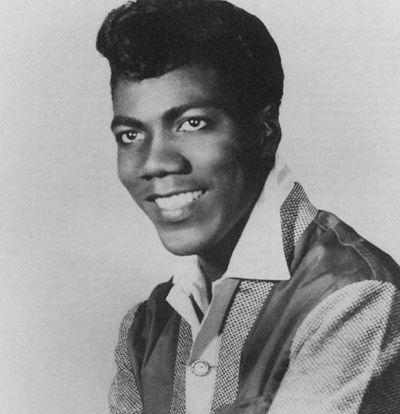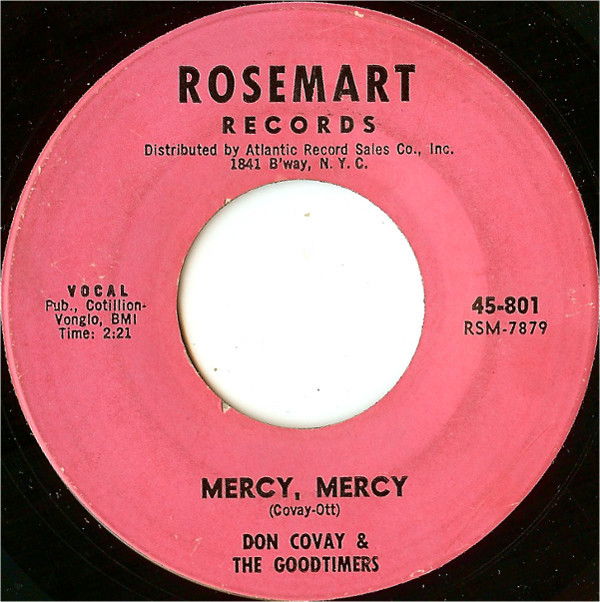DON COVAY

A prolific songwriter, Don Covay was better known for covers of his material by others than for anything he himself recorded.
He was born Donald James Randolph in Orangeburg, South Carolina, on March 24, 1936. He lost his father, a Baptist preacher, at age eight. By the early ‘50s, Covay was living in Washington, D.C. He sang with a gospel group called the Cherry Keys before turning to secular music. Covay made his first non-gospel recordings in 1956 with a doo-wop group called the Rainbows.
In 1957, Covay worked with the Little Richard Revue as both the star’s chauffeur and opening act. Also that year, Atlantic released a single on Covay, the Rhythm & Blues rocker “Bip Bop Bip,” under the name Pretty Boy. Little Richard and his band, the Upsetters, provided the instrumentation.
In 1961, Covay had his first charted single, the self-written “Pony Time.” (The label credit went to his band, the Goodtimers.) It reached #60 on the Billboard Hot 100 and became a #1 hit when Chubby Checker covered it. Three years later, Covay co-wrote and recorded “Mercy, Mercy.” It went to #1 on the R&B chart and #35 pop. A year later, the Rolling Stones remade the song for their LP, Out of Our Heads.
Covay co-wrote his 1965 number, “See-Saw,” with guitarist Steve Cropper of Booker T. & The MGs. He recorded the song at the Stax studios in Memphis, along with three other Covay originals: “I Never Get Enough of Your Love,” “Sookie Sookie” (which Steppenwolf later recorded), and “Iron Out the Rough Spots.” While Covay’s original of “See-Saw” did well, it became an even bigger hit for Aretha Franklin three years later.
In 1968, Covay recorded a one-off single with Atlantic labelmates Solomon Burke, Arthur Conley, Ben E. King, and Joe Tex as the Soul Clan. “Soul Meeting” reached #34 R&B and #91 pop. In 1969, Covay formed the short-lived Jefferson Lemon Blues Band, who recorded two albums.
In 1972, Covay joined Mercury as an Artists & Repertoire executive. He also recorded for the label. His first Mercury single was the tongue-in-cheek “I Was Checkin’ Out, She Was Checkin’ In.” It became Covay’s biggest pop hit, reaching #29 in 1973. By the late ‘70s, he was on Kenny Gamble and Leon Huff’s Philadelphia International Records. After that, Covay did not record again until 1986, when he sang back-up on the Rolling Stones’ album, Dirty Work.
In 1993, the Shanachie label released a tribute CD, Back to the Streets: Celebrating the Music of Don Covay. Among the artists who performed on it: Ronnie Wood of the Rolling Stones, Iggy Pop, Robert Cray, Bobby Womack, Peter Wolf of the J. Geils Band, Ben E. King, Jim Carroll, Todd Rundgren, Gary “U.S.” Bonds, Chuck Jackson, Barrence Whitfield, Billy Squier, Nona Hendryx, and Jimmy Witherspoon.
In 1994, the Rhythm & Blues Foundation presented Covay with a Pioneer Award. In 2000, he released Adlib, his first album in 23 years. Artists who appeared on it included Wilson Pickett, Lee Konitz, Otis Clay, Ann Peebles, Paul Shaffer, Syl Johnson, Huey Lewis, and Dan Penn.
Covay’s songwriting ultimately proved more lucrative than his recordings did. He composed songs for the likes of Lloyd Price (“Boo Hoo”), Gladys Knight & The Pips (“Letter Full of Tears”), Solomon Burke (“I’m Hanging Up My Heart for You”), Gene Chandler (“You Threw a Lucky Punch”), Tommy Tucker (“Long Tall Shorty”), Little Richard (“I Don’t Know What You Got, But It’s Got Me”), and Wilson Pickett (“That Kind of Love”). Covay also penned Aretha Franklin’s 1967 classic, “Chain of Fools.”
Don Covay, 78, died of a stroke on January 31, 2015.
Charted singles:
“Pony Time” (as the Goodtimers, 1961) Pop #60
“The Popeye Waddle” (1962) Pop #75
“Mercy, Mercy” (Don Covay & The Goodtimers, 1964) R&B #1 (2 weeks), Pop #35
“Take This Hurt Off Me” (1964) R&B #44, Pop #97
“Please Do Something” (1965) R&B #21
“See-Saw” (Don Covay & The Goodtimers, 1965) R&B #5, Pop #44
“Shingaling ‘67” (1967) R&B #50
“Soul Meeting” (as a member of the Soul Clan, 1968) R&B #34, Pop #91
“Black Woman” (Don Covay & The Jefferson Lemon Blues Band, 1970) R&B #43
“I Was Checkin’ Out, She Was Checkin’ In” (1973) R&B #6, Pop #29
“Somebody’s Been Enjoying My Home” (1973) R&B #53
“It’s Better to Have (And Don’t Need)” (1974) R&B #21, Pop #63
“Rumble in the Jungle” (1975) R&B #83
“Badd Boy” (1980) R&B #74

